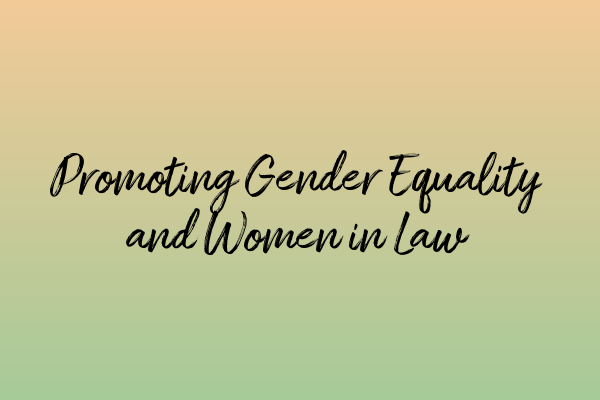Promoting Gender Equality and Women in Law
Gender equality and representation of women in the legal profession have been pressing issues for many years. While progress has been made, there is still a long way to go in achieving true gender equality within the legal industry. In this blog post, we will explore the importance of promoting gender equality and empowering women in law, and discuss ways in which we can work together to create a more inclusive and diverse legal profession.
The Importance of Gender Equality in Law
Gender equality is not only a fundamental human right but also a crucial factor in developing a fair and just legal system. When women are underrepresented in the legal profession, it limits the perspectives and experiences brought to the table, resulting in an incomplete understanding of the issues at hand. By promoting gender equality, we can ensure a more balanced and inclusive legal system, better equipped to serve all individuals in society.
Moreover, gender equality in law is essential for fostering public trust and confidence in the legal profession. When people see a diverse and representative legal system, they are more likely to have faith in its ability to deliver justice impartially. This, in turn, strengthens the overall credibility of the legal profession and the rule of law.
Challenges Faced by Women in Law
Despite significant progress, women still face numerous challenges in the legal profession. One of the key challenges is the underrepresentation of women in senior leadership positions. Many women struggle to break through the glass ceiling and secure top-level positions in law firms and other legal organizations. This lack of representation not only perpetuates gender inequality but also limits the available role models for aspiring female lawyers.
Another challenge faced by women in law is the work-life balance dilemma. Balancing family responsibilities and demanding legal careers can be particularly challenging for women, often leading to difficult choices and sacrifices. This can result in fewer women progressing to senior roles or leaving the profession altogether.
Promoting Gender Equality in the Legal Profession
Promoting gender equality requires a collective effort from both individuals and organizations within the legal profession. Here are some strategies that can help create a more inclusive and equal workplace:
- Implementing diversity and inclusion programs: Law firms and legal organizations can establish initiatives aimed at promoting diversity and inclusion. This can include mentorship programs, unconscious bias training, and flexible work arrangements to support a more inclusive workplace.
- Providing equal opportunities for professional development: It is essential to ensure that women have the same access to advancement opportunities, including networking events, training programs, and challenging assignments. This will help bridge the gender gap in career progression.
- Mentorship and sponsorship: Establishing mentorship and sponsorship programs can help guide and support aspiring female lawyers. Mentors can provide valuable advice, guidance, and advocacy, while sponsors can actively promote women for leadership positions.
- Advocacy and awareness: Raising awareness about the importance of gender equality and addressing unconscious biases within the legal profession is crucial. This can be done through events, conferences, and internal training sessions.
Women in Law: Breaking Barriers
Despite the challenges, numerous inspiring women have broken barriers and achieved great success in the legal profession. Their stories serve as a source of inspiration and motivation for aspiring female lawyers.
To excel in criminal law, for example, check out our related article on SQE Prep: Tips and Tricks to Excel in Criminal Law. This article provides valuable tips and insights for those preparing to specialize in criminal law.
Additionally, mastering the art of questioning is essential for any lawyer. Our related article on Cross-Examination Techniques: Mastering the Art of Questioning delves into the techniques and strategies involved in effective cross-examination.
If you’re interested in exploring non-governmental prosecutions in criminal cases, our article on Private Prosecutions: Exploring Non-Governmental Prosecutions in Criminal Cases provides valuable insights into this topic.
As ethical considerations are vital in criminal defense, our article on Ethical Challenges in Criminal Defence: Navigating Dilemmas offers guidance on navigating ethical challenges within the legal profession.
Lastly, understanding the legal parameters of assault and battery is crucial. Take a look at our related article on Assault and Battery Laws: Understanding the Legal Parameters to gain a comprehensive understanding of this area of law.
Conclusion
Promoting gender equality and empowering women in law is essential for creating a more inclusive and representative legal profession. By addressing the challenges faced by women, implementing diversity and inclusion initiatives, and providing equal opportunities, we can work towards a more balanced and just legal system. Through collective effort and advocacy, we can pave the way for future generations of women to thrive in the legal profession.


Leave a Reply